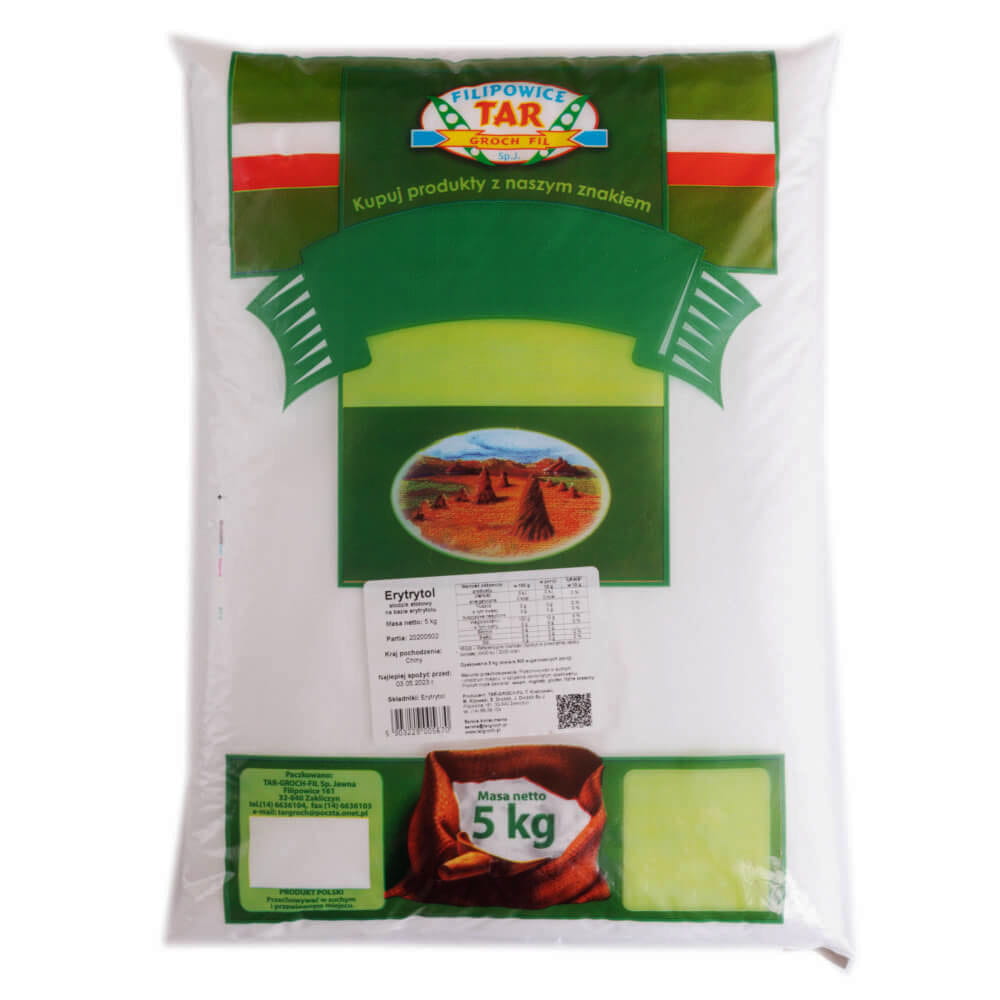Erythritol Erythrol Erythritol naturally low in calories 5kg 5000g TARGROCH
- Regular price
- €39,22
- Regular price
-
- Sale price
- €39,22
- Unit price
- per
Couldn't load pickup availability
Description
xDESCRIPTION
- a sweetener with only 0.2 kcal
- has a glycemic index of zero
- inhibits the action of bacteria that cause tooth decay
- the perfect substitute for traditional sugar
Erytrol and Erythritol are interchangeable names of the same product. It is a sweetener that belongs to the group of polyhydroxy or sugar alcohols. Erythritol occurs naturally in fruits such as melons, pears, and grapes, as well as corn, seaweed, lichen, and red wine. In industry, it is obtained by fermentation, the same process used to make cheese, but fruit is used instead of milk. Another extraction method is the use of glucose and various types of yeast or glycerol, also using microorganisms, in this case Yarrowia lipolitica.
It can be used as a substitute for traditional sugar, which is very similar in appearance. It is perfect for sweetening coffee, tea, desserts and as an ingredient in cakes. However, erythritol is less sweet, it has about 60-70% the sweetness of sucrose (sugar), which should be taken into account in recipes when substituting these products. When consumed, it leaves a slightly cool feeling in the mouth. Its main advantage over sugar is above all its low calorie content and the fact that it has a zero glycemic index and therefore does not raise blood sugar levels. 1g of erythritol has only about 0.2 kcal, which is why it is called a "calorie-free sweetener". Of the sweeteners available, this is the lowest calorie option with virtually no nutritional value, making it ideal for people controlling their weight. Erythrol is not metabolized by our body as we do not have an enzyme to break it down. It is almost completely excreted and does not affect the intestinal microflora at all. It should not be used by children under 3 years old due to the not yet fully developed digestive system, and besides it has no contraindications and side effects.
< strong > INGREDIENTS
erythritol
Net weight: 5 kg
Nutritional value of the product in 100 g:
Calorific value: 0 kJ / 0 kcal
Fat: 0g
- incl saturated acids fatty acids: 0 g
Carbohydrates: 100 g
- of which sugars: 0 g
Dietary fiber: 0 g
Proteins: 0 g
Salt: 0 g
APPLICATION :
Use like regular sugar.
In recipes that substitute erythritol for sugar, we should use the following ratio: replace 5g of sugar with about 7g of erythritol to get the same sweetness. The use of erythritol in yeast cakes is not recommended as it slows down the rise of the dough.
ALLERGEN INFORMATION
W the plant also packs: sesame, almonds, products containing gluten, various nuts. Despite all efforts, the presence of these raw materials in the product cannot be 100% ruled out.
RECOMMENDED STORAGE CONDITIONS
Store in a dry place in a cool place in a tightly closed container.
similar products
- Regular price
- €39,22
- Regular price
-
- Sale price
- €39,22
- Unit price
- per
- Regular price
- €39,22
- Regular price
-
- Sale price
- €39,22
- Unit price
- per
- Regular price
- €39,22
- Regular price
-
- Sale price
- €39,22
- Unit price
- per
- Regular price
- €39,22
- Regular price
-
- Sale price
- €39,22
- Unit price
- per
- Regular price
- €39,22
- Regular price
-
- Sale price
- €39,22
- Unit price
- per
- Regular price
- €39,22
- Regular price
-
- Sale price
- €39,22
- Unit price
- per
- Regular price
- €39,22
- Regular price
-
- Sale price
- €39,22
- Unit price
- per
- Regular price
- €39,22
- Regular price
-
- Sale price
- €39,22
- Unit price
- per
- Regular price
- €39,22
- Regular price
-
- Sale price
- €39,22
- Unit price
- per
- Regular price
- €39,22
- Regular price
-
- Sale price
- €39,22
- Unit price
- per
Recently Viewed Products
- Regular price
- €39,22
- Regular price
-
- Sale price
- €39,22
- Unit price
- per
- Regular price
- €39,22
- Regular price
-
- Sale price
- €39,22
- Unit price
- per
- Regular price
- €39,22
- Regular price
-
- Sale price
- €39,22
- Unit price
- per
- Regular price
- €39,22
- Regular price
-
- Sale price
- €39,22
- Unit price
- per
- Regular price
- €39,22
- Regular price
-
- Sale price
- €39,22
- Unit price
- per
- Regular price
- €39,22
- Regular price
-
- Sale price
- €39,22
- Unit price
- per
- Regular price
- €39,22
- Regular price
-
- Sale price
- €39,22
- Unit price
- per
- Regular price
- €39,22
- Regular price
-
- Sale price
- €39,22
- Unit price
- per
- Regular price
- €39,22
- Regular price
-
- Sale price
- €39,22
- Unit price
- per
- Regular price
- €39,22
- Regular price
-
- Sale price
- €39,22
- Unit price
- per
- Choosing a selection results in a full page refresh.











